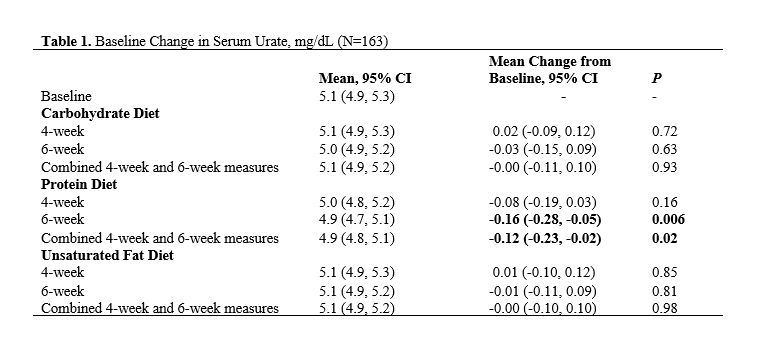Session Information
Session Type: Poster Session B
Session Time: 9:00AM-11:00AM
Background/Purpose: Diet is a significant determinant of hyperuricemia and risk for gout. Dietary recommendations to prevent gout emphasize reducing purine intake; however, low-purine diets are often ineffective in preventing gout and have unknown effects on cardiovascular disease risk factors, such as hypertension and hyperlipidemia, which often accompany gout. Meanwhile, studies suggest that the DASH diet reduces serum urate while also lowering blood pressure and lipids. Whether DASH-pattern diets that emphasize different macronutrient proportions might enhance serum urate reduction is not known.
Methods: We conducted a secondary analysis of the Optimal Macronutrient Intake Trial to Prevent Heart Disease (OmniHeart) feeding study, a 3-arm, crossover design, randomized trial of 191 adults with prehypertension or stage I hypertension (defined at the time of the trial as systolic blood pressure 120-159 mm Hg or diastolic blood pressure 80-99 mm Hg) who were not on antihypertensive medications. Participants were randomized to one of three DASH-pattern diets that emphasized either carbohydrates (CARB), protein (PROT), or unsaturated fat (UNSAT). Calories were adjusted as needed to maintain body weight throughout the study. We compared the effects of these diets on serum urate at weeks 4 and 6 of each feeding period.
Results: A total of 163 participants were included in the final analysis (mean age 53.5 yrs, 45% women, 55% black). The mean BMI was 30.2 kg/m2 and 56.7% had hypertension. The PROT diet reduced serum urate from baseline at the end of the 6-week feeding period (-0.16 mg/dL; 95% CI: -0.28, -0.05; P = 0.006) (Table 1). In contrast, neither the CARB diet (-0.03 mg/dL; 95% CI: -0.15, 0.09; P = 0.63) or the UNSAT diet (-0.01 mg/dL; 95% CI: -0.11, 0.09; P = 0.81) reduced serum urate. Compared with the CARB and UNSAT diets, the PROT diet lowered serum urate by 0.12 mg/dL (95% CI: -0.20, -0.04; P = 0.005) and 0.12 mg/dL (95% CI: -0.20, -0.05; P = 0.001), respectively (Table 2). When stratified by baseline serum urate ≥ 6 mg/dL (n = 29), all diets significantly reduced serum urate from baseline (-0.39 to -0.52 mg/dL) and there was no significant difference between diets.
Conclusion: A DASH-pattern diet emphasizing plant-based protein lowered serum urate compared with those emphasizing carbohydrates or unsaturated fat. These findings suggest that a DASH-pattern diet emphasizing plant-based protein may enhance serum urate reduction. Overall, a DASH-pattern diet emphasizing plant-based protein has the potential to lower serum urate while also improving hypertension and hyperlipidemia. A definitive trial to test the ability of a DASH-pattern diet emphasizing plant-based protein to lower the incidence of gout is warranted.
To cite this abstract in AMA style:
Belanger M, Wee C, Mukamal K, Miller E, Sacks F, Appel L, Shmerling R, Choi H, Juraschek S. The Effects of Dietary Macronutrients on Serum Urate: A Secondary Analysis of the OmniHeart Trial [abstract]. Arthritis Rheumatol. 2020; 72 (suppl 10). https://acrabstracts.org/abstract/the-effects-of-dietary-macronutrients-on-serum-urate-a-secondary-analysis-of-the-omniheart-trial/. Accessed .« Back to ACR Convergence 2020
ACR Meeting Abstracts - https://acrabstracts.org/abstract/the-effects-of-dietary-macronutrients-on-serum-urate-a-secondary-analysis-of-the-omniheart-trial/


